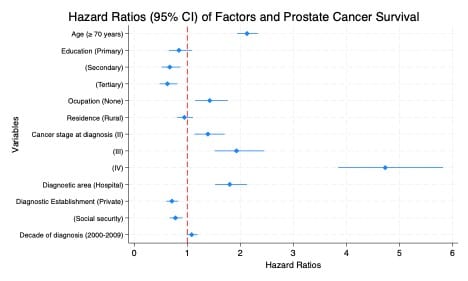Cancer
Social factors and prostate cancer survival in Quito-Ecuador, between 2000 and 2019 Harold Alexander* Harold Alexander María Fernanda García Yunqi Yu Liu
Introduction: Prostate cancer is a global health concern, the second most diagnosed cancer among men, and a leading cause of cancer-related mortality in Ecuador. While genetic and biological factors have been studied, the impact of social factors on survival remains unclear in Quito, where inequalities in healthcare access and education persist. Lower educational levels and unemployment are linked to limited healthcare access and worse survival. This study assessed the association between social factors (education, residence, occupation, and healthcare access) and survival in prostate cancer patients in Quito from 1989 to 2019.
Methods: A secondary, retrospective cohort study was conducted using data from the National Tumor Registry of Solca-Quito. Men diagnosed with prostate cancer between 2000 and 2019 were included (with follow-up until August 14, 2024). Survival was compared across social groups using multivariate Cox regression, adjusting for clinical and social variables.
Results: Of 4,595 patients, most were diagnosed at stage II (53.9%) or stage IV (26.7%). Median survival was 7.51 years (IQR 4.73–11.35). Advanced age (≥70 years) increased mortality risk (HR = 2.13; 95% CI: 1.94–2.33; p < 0.001). Higher education showed a protective effect (secondary: HR = 0.67; tertiary: HR = 0.63; p < 0.01). Stage IV cancer strongly increased mortality (HR = 4.73; 95% CI: 3.84–5.82; p < 0.001). Hospital-based diagnosis versus laboratory diagnosis raised mortality risk (HR = 1.80; 95% CI: 1.52–2.13; p < 0.001), while private or social security-based healthcare was protective (HR = 0.71 and 0.78; p < 0.01).
Conclusions: Social factors influence survival in prostate cancer. Advanced age and late-stage diagnosis increase mortality, while higher education and better healthcare access improve survival. Policies addressing social disparities and healthcare access are essential to improve outcomes.
Keywords: Prostate cancer, education, mortality, survival, Ecuador.

